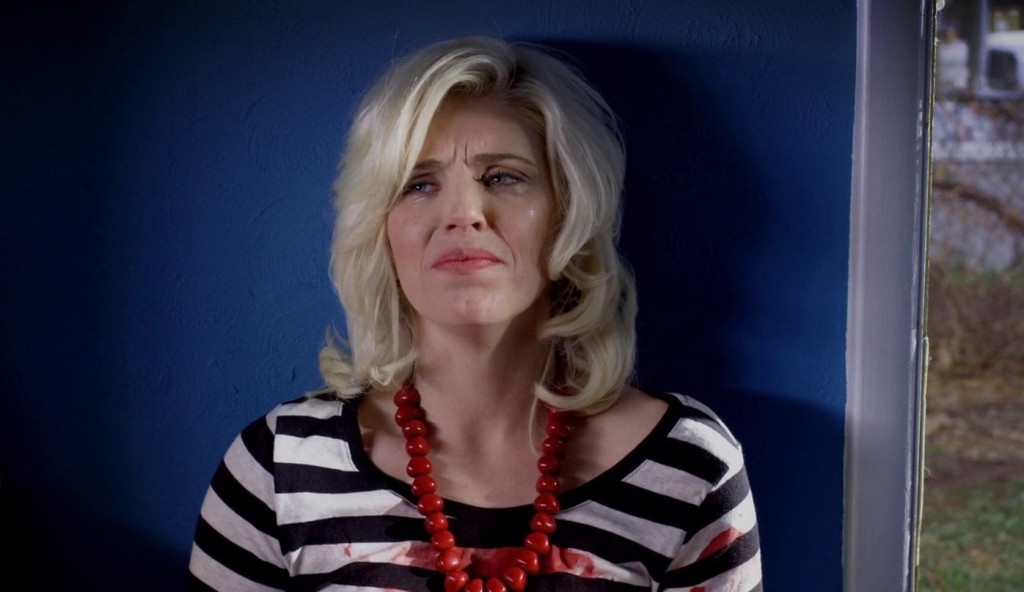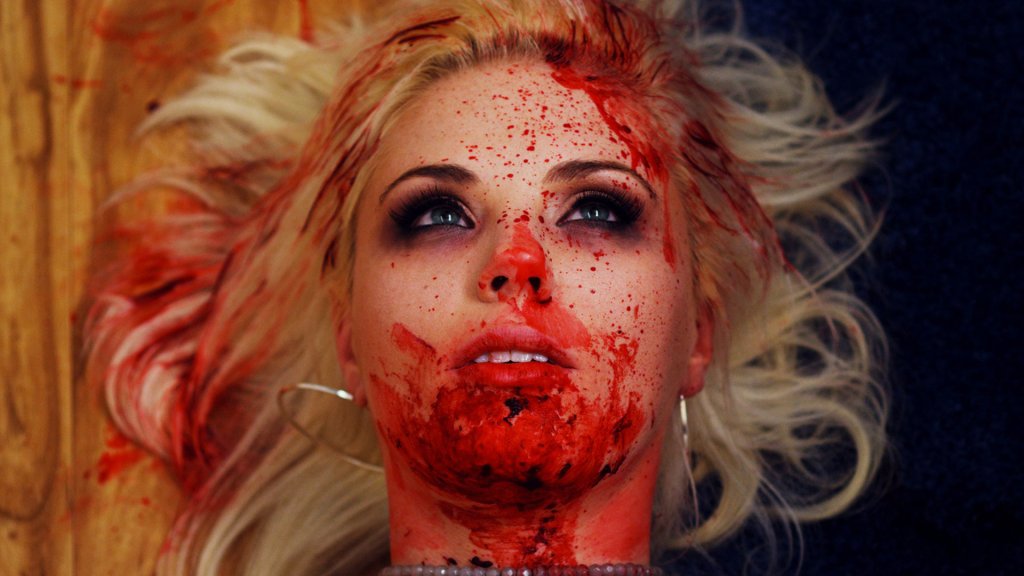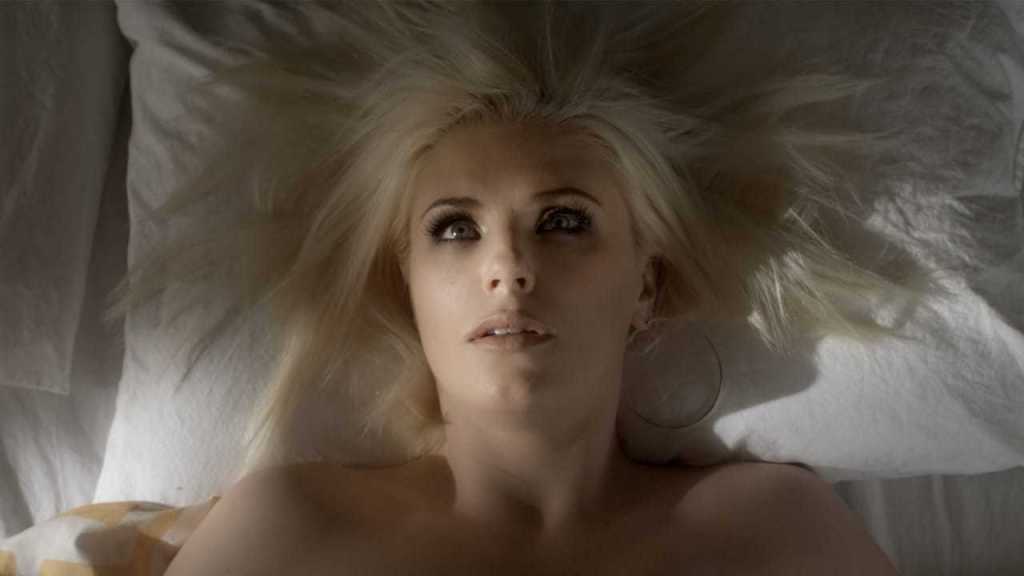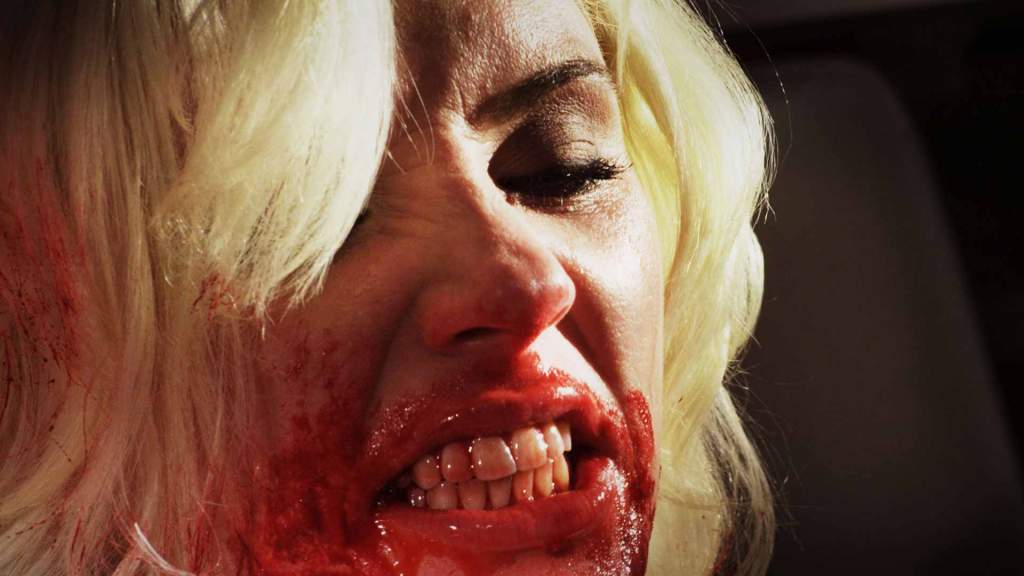Spoilers
“Eat Your Heart Out”: Freudian cinephile Mary Wild – lecturer at the Freud Museum and co-host of the Projections Podcast – takes a bite out of this underseen auto-cannibal movie…
Jimmy Weber’s horror film Eat (2014) opens with out-of-work actress Novella McClure (Meggie Maddock) going through the steps of her morning routine, getting ready to attend another in a long line of unsuccessful auditions in Los Angeles. The montage is set to Jeffree Star’s oddly catchy song, “Beauty Killer”.
Novella’s look is like a Halloween costume, of a woman on autopilot trying to attract male attention, whilst being visibly disinterested in the masquerade of it: bleach-damaged blonde hair, micro-mini skirt, heavily loaded false strip lashes, gaudily painted nails, with her posture collapsing into vertiginous polka dot wedge heels.
At the audition Novella runs against her acting rival Tracy; they exchange unpleasantries and Tracy quips, “Eat your heart out!”, before launching into a power move with the casting agent. There’s no reprieve from problems at home; Novella is facing eviction for being several months late on rent.
She can’t make ends meet, her bank account’s hollowed out, and there’s no food left in her kitchen. Her best friend Candice (Ali Francis) gives her pep talks about “following her dreams” and offers distraction by way of partying, but it’s no use. Novella is running on empty.

The lines in Weber’s script are so peculiar. You’d be forgiven for wanting to stop the film after the first ten minutes; the dialogue is cliché and the delivery, awkward. However, I suspect this is all done intentionally, to misdirect and create a false sense of reassurance in a cinematic atmosphere that suddenly takes a turn for the nauseatingly grotesque.
Because you see, when the stress of living in abject poverty gets too much for Novella, something shifts in her eyes. They go blank, a primal impulse takes hold of her and she finds a quiet spot somewhere and auto-cannibalises. Ravenously biting and tearing away flesh from her own finger, hand, arm, foot. There’s a hangnail shot that makes the one in Darren Aronofsky’s Black Swan (2010) look like child’s play. Novella gnaws away at herself, mesmerised, in interminable scenes of gore. There are many protracted sequences of the browbeaten blonde binge-eating herself, and she does it so voraciously, passionately, blood smeared and caked all over her. It’s almost erotically entrancing to look at. Almost.
A certain pattern emerges: Novella feels the pull to auto-feast precisely at moments in the film when something terrible happens to her. Professional rejection, boyfriend woes, losing her apartment – our girl is in a downward spiral. The self-slaughtering rampages are coded as dissociation; Novella disappears into another realm, escapes the wretched misery of her life, tucks in and checks out. Or perhaps it’s a panic attack, a deep fear that sets in, and she goes berserk?

Either way, it’s scary as hell. I’ve seen plenty of mindfuck movies, but Eat is one of few that truly disturbed me. I’m not kidding! The special effects are pretty good for a micro-budget film, but it’s more than that. Novella’s wanton abandon, in a deadlock of ingesting herself, is rooted in something seriously macabre, irrepressible, that can only be implied, not outwardly shown. That’s what really got to me.
In the 1917 text “Mourning and Melancholia”, Sigmund Freud distinguishes between ordinary grief (the conscious response to a specific death) and melancholia (an unconscious reaction to a loss that cannot be physically seen). He discusses the problem of facing what seems to be a surplus of pleasure in the world, and how we’re becoming over-exposed to it, to the point where pleasure is both omnipresent and unattainable – we can’t help becoming deadened to it. This line from Freud could practically be the tagline for L.A.; it must be awful to be a depressive in a city so intent on performing pleasure incessantly.
Freud goes on to describe melancholia as being like an “open wound”, drawing to itself cathectic energies, emptying the conscious personality until it is totally impoverished. It all reads like a horror script, with melancholia linked to a regression to the oral (cannibalistic) stage of psychosexual development: “The Ego wants to incorporate the lost object into itself by devouring it.” And this, I believe, is the key to understanding Weber’s film.

Novella is losing everything. She’s losing herself, and she knows it. The world she occupies is so annihilating. It makes sense, doesn’t it, that she’d feel compelled to reclaim herself, grab hold of herself somehow? She longs to reintroduce the lost object into herself, embody it, by consuming it orally. Auto-cannibalism in this film is a final attempt by the depressive subject to reunite with what she believes she has lost irretrievably.
At one of her auditions, Novella shows up wearing a white T-shirt with a massive black heart on it, and recites a cringeworthy monologue about finally being seen for who she is, or whatever. The guys interviewing her burst out laughing; they’re shooting a porno and what they really want to know is, will she do anal? The crux of the film is contained in this scene: Novella’s got a big heart but it’s going dark because – increasingly – she is misunderstood and asked to give what she does not have. Novella is losing everything, and now she’s losing heart, too.
Which is why, eventually, she decides to incorporate the ultimate lost object into herself by devouring it. Novella sits down on the kitchen floor, stabs herself in the chest with a chef’s knife, inserts her whole hand inside the wound, pulls out her still-beating heart, and takes a big bite, chewing greedily. A few seconds before dying, Novella smiles and looks content for the first time since the start of the film. This disgusting coda is one of the saddest things I’ve ever seen. Novella ate her heart out, in part because she suffered excessive longing for unattainable things, but mostly because she wanted to realign with her humanity, and reclaim what she had utterly lost.
Jimmy Weber’s Eat took me by surprise; it’s a very effective and underrated body horror film. In the face of what is on the surface a trashy and amateurish movie, my advice is that you hang on.
![]() Mary Wild
Mary Wild
